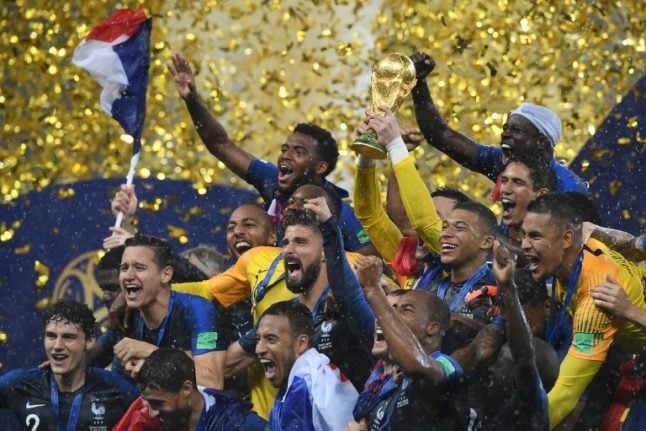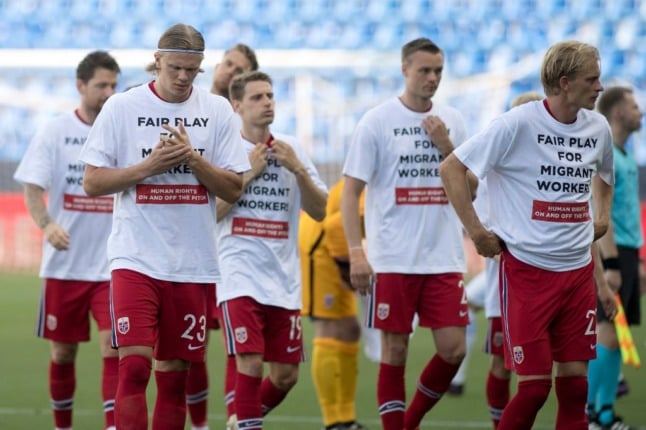Ever since France won the World Cup on Sunday evening a row, with racist undertones, has been bubbling over.
It has mainly been occurring outside France with the Venezuelan president Nicolas Maduro having his say as well as Croatian footballers and Italian journalists.
Even former US President Barack Obama has waded into the row.
Maduro's comments sum up the views of a minority, perhaps bitter about Les Bleus' victory, who pointed to the ethnic origins of the players in a bid to suggest that the World Cup triumph had nothing to do with France.
“The French team looked like an African team, in fact it was Africa who won,” said Maduro. “France won thanks to African players or the sons of Africans.”
Maduro did congratulate France and called for an end to racism in Europe against African people, but his words about the French team stuck.
It was a theme expressed far and wide and not just in the caves of social media where trolls hang out.
French newspaper Les Echos noted how France's victory had been greeted with a tide of racist comments in Italy that some journalists and newspapers had only helped to fuel.
“A team full of Africans blended with some very good white players played against a team from a country at the centre of three great football schools of thought: Slavic, German and Italian,” wrote Italian Corriere della Sera giving its perception on the differences between France and Croatia.

CLICK HERE to sign up for full access to The Local France (Just €2.49/month).
Even on the eve of the final former Croatian player Igor Stimac said the country's team were up against “the republic of France and the African continent.”
And even the host of The Daily Show in America Trevor Noah tried to joke about the origins of the French team by claiming “Africa won the World Cup” and ended up being accused of racism and poor humour.
TONIGHT: Congratulations to Africa on winning the 2018 Men’s World Cup! pic.twitter.com/ly1wxU1VzT
— The Daily Show (@TheDailyShow) July 17, 2018
Former US president Barack Obama even got involved to rubbish all those suggesting the players were not French.
“Just ask the French football team that just won the World Cup… Not all of those folks looked like Gauls to me. But they're French! They're French,” said Obama during a speech in South Africa to commemorate 100 years since the birth of Nelson Mandela.
US-based French basketball player Evan Fournier also fired off on Twitter.
“Stop it with this “Africa won the world cup for France” nonsense. Is it Africa winning when the USA win Gold medals in the Olympics? he said.
Stop it with this “Africa won the world cup for France” non sense.
Is it Africa winning when the USA win Gold medals in the Olympics ?
Is it Europe winning when South Africa win in Rugby ? And we can go on and on. Cut the BS. We are all french deal with it????— Evan Fournier (@EvanFourmizz) July 17, 2018
What was perculiar and perhaps positive was that up until that point there was a distinct lack of talk about the origins of the French players in France itself.
While the 1998 World Cup win with a multi-racial team was heralded as a victory for the “Black-Blanc-Beur” (Black, white and Arab) generation and sparked much pondering over the benefits of France being a multi-cultural society, the 2018 win was heralded as a victory for just one colour – les bleus.
“Proud to be blue” were the words emblazoned across the Arc de Triomphe following Sunday's final win.

But eventually the French players – who had remained silent, perhaps bemused by the row, felt compelled to speak out.
The team's players have regularly talked of their pride for playing in multi-racial team that represents a multi-cultural country.
“That's France. There are many origins here. That's what makes France beautiful,” said the team's talisman Paul Pogba, before Sunday's final.
Perhaps the best response to the row was by the French defender Benjamin Mendy, who replied to a tweet by the Sporf website which in a positive attempt to highlight the origins of the players put a flag next to each name in the French squad.
Mendy replied to the Tweet by simply putting a French flag next to the names of each player along with the word “fixed”.
That really should be the last word.
?? Pogba
?? Tolisso
?? Mendy
?? Umtiti
?? Rami
?? Fekir
?? Kimpembe
?? N’Zonzi
?? Matuidi
?? Mandanda
?? Sidibe
?? Kante
?? Lloris
?? Hernández
?? Dembele
?? Mbappe
?? Griezmann
?? Giroud
?? Lemarfixed ?
— Benjamin Mendy ⭐️⭐️ (@benmendy23) July 17, 2018



 Please whitelist us to continue reading.
Please whitelist us to continue reading.
Member comments